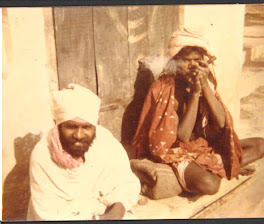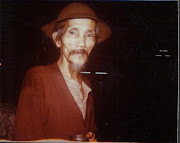 Somewhere crowded among the memories are images of cottony clouds swirling among very tall mountains. These would be the Himalayas and I would be looking out the window of a UBA flight between Kathmandu and Rangoon daydreaming. It was evening by the time the plane landed; it had been along day, during the stopover in Calcutta I ran to the duty free shop for the purchase of two highly prized items, Marlboro cigarettes and Johnny walker scotch. Like everything in Burma, trade is strictly controlled, so a huge black market exists for anything foreign. On landing I breezed thru customs and was ignored by the swarm of heavily armed security forces, then mobbed by the black marketers who started a bidding war for my contraband. After selling the cigarettes and whiskey for almost 5 times what I paid, I was offered tempting sums for everything from watch and camera to jeans. It was getting late and I was tired so I shared a taxi with some of my fellow passengers who were also headed to the only decent lodging in town, the infamous YMCA.
Somewhere crowded among the memories are images of cottony clouds swirling among very tall mountains. These would be the Himalayas and I would be looking out the window of a UBA flight between Kathmandu and Rangoon daydreaming. It was evening by the time the plane landed; it had been along day, during the stopover in Calcutta I ran to the duty free shop for the purchase of two highly prized items, Marlboro cigarettes and Johnny walker scotch. Like everything in Burma, trade is strictly controlled, so a huge black market exists for anything foreign. On landing I breezed thru customs and was ignored by the swarm of heavily armed security forces, then mobbed by the black marketers who started a bidding war for my contraband. After selling the cigarettes and whiskey for almost 5 times what I paid, I was offered tempting sums for everything from watch and camera to jeans. It was getting late and I was tired so I shared a taxi with some of my fellow passengers who were also headed to the only decent lodging in town, the infamous YMCA.Burma, part of the once glorious British Empire has fallen into a crumbling state of disrepair, due to paranoid isolation, shortsighted totalitarianism, and bungling bureaucratic inefficiency. The streets of Rangoon are full of fine examples of grand colonial architecture; few are habitable let alone function as intended. Through all the gloom the people remain optimistic, they are spiritual, mild mannered and education hungry, and their friendliness and hospitality made the Burmese experience one of my favorite. Grace and beauty are everywhere women commonly use thanaka (sandalwood paste) as a facial, smoking cigars is common but women tend to carry an ashtray for some reason.
Due to its literary reputation, Mandalay is one of the most famous cities in Burma yet to me it was one of the least known and most exotic places in Asia and a top priority. At the time Burmese visas were limited to a maximum of 7 days and extensions are not allowed. This is incredible considering how badly they need the money tourism could generate. So after less than 24 hours in Rangoon it was time to leave. The roads are few and poorly maintained, so rails and rivers are the main arteries. I arrived at the train station early in the morning and we left with little fanfare, but soon fell behind schedule and arrived hot tired and 4 hours late. The train was very basic, all one class, with unpadded wood bench seats and no fans, fortunately it wasn’t crowded and everyone was friendly. While there was daylight the tracks seemed to pass thru the middle of a dense jungle.

I arrived at midnight by Tonga at the guesthouse, very tired after 16 hours on a hot train. Stepping inside I was not surprised by the lack of plumbing or electricity but the flimsy construction did concern me a bit. As I walked in the whole structure shook and by lantern light I could see everything was mad of bamboo and palm. A strong wind could lift it off its foundation and a spark could burn it to the ground. Another concern was the numerous frogs and lizards, which were feeding on the thousands of mosquitoes and insects, which were beginning to feed on me. Realizing that I was stuck here for the night I passed thru a partition and made myself comfortable on the springy bamboo flooring and was about to doze off but the innkeeper had another idea. He to tried to sell me everything from jewels to opium then he asked the value of everything I had, and eventually we engaged in a trading session both of us convinced we had out smarted the other and feeling pleased with our new possessions. That night my dreams ranged between contented opium soaked euphoria and an exotic primeval anti malarial nightmare. Waking anxious and excited Mandalay felt vaguely familiar yet extremely exotic. Mandalay Hill is a walled compound surrounded by a moat and guarded by a giant pair of gilded Fu dogs, once reserved for royalty, while in the colonial town roads are laid out in a familiar grid pattern but the numbers are out of sequence a subtle difference that made me realize I was in the Far East now.
Hot and sweaty from the walk back to town I walked into, what I thought was a grocery store and was ushered to a seat at a formally appointed table. I soon realized I had stumbled into a wedding reception looking for ice cream. To make matters worse I was dressed in rags compared to the formal wear of the invited guests and the royal finery of the bride and groom. Still my bumbling entrance was accepted as an omen and I was treated like an honored special guest and I got my ice cream.

Reluctantly I plan to leave Mandaly and travel by boat down the Irawady River to Pagan. The boat is an exciting new experience and all eyes are on me at the landing as we prepare to board. The boat a steam-powered paddle wheeler is reminiscent of Mark Twain. The deck is crowded with women smoking the popular cheroot like cigars and always an ashtray nearby. I spend the night sleeping on the deck and wake the next morning sailing down the river with banks dotted with temples, monuments and villages. The view from the deck is a timeless scene of life on the river, children swimming and playing, women cooking and washing while the men tend the fields. At each village we stop to discharge and accept passengers no matter how small. In the evening we arrive and a Tonga Walla deposits me at another flimsy bamboo guesthouse. In the morning the Tonga is there to take me the short distance to an open plain filled with a spectacular collection of ancient ruins. Laid out before me were dozens of crumbling and a few restored temples and shrines, some adorned with gold. Alone and with complete access I explored the ruins and learned all I could of Burma’s glory days. The most striking memory concerns the flattening of gold bars into paper thin sheets called gold leaf. This was done by monks wielding huge sledge hammers and pounding the gold thinner and thinner. The leaves were then used for decorative objects, spiritual offerings and sometimes for physical healing.
People followed me everywhere, eager to engage they shouted good morning, where you from? Sometimes they offered food or drinks but most just wanted to practice their English. They were mostly friendly and polite, but once I was verbally accosted by a large aggressive man at a train station.
 He badgered me about travel documents and threatened to arrest me. Maybe he was drunk or the town bully, after awhile I realized he was bluffing and only making himself the center of attention. It was at the same train station that I had an even more troubling experience. Suddenly struck with a familiar but urgent cramping of the bowel I followed the overpowering stench to the public toilet. Upon entering I saw 2 planks crisscrossed a foot or more above the floor when my eyes had adjusted I noticed that the floor was covered with maggots feeding on a massive mound of feces and floating in a sea of urine. One slip and I would be in deep shit.
He badgered me about travel documents and threatened to arrest me. Maybe he was drunk or the town bully, after awhile I realized he was bluffing and only making himself the center of attention. It was at the same train station that I had an even more troubling experience. Suddenly struck with a familiar but urgent cramping of the bowel I followed the overpowering stench to the public toilet. Upon entering I saw 2 planks crisscrossed a foot or more above the floor when my eyes had adjusted I noticed that the floor was covered with maggots feeding on a massive mound of feces and floating in a sea of urine. One slip and I would be in deep shit.Finally back in Rangoon on my last day in Burma I met a rickshaw Walla who was so sincerely friendly he had to show me the room he shared with several others and his few prized possessions. One was an address book signed by the many travelers he had befriended along with a few pictures of his family and his village. He was university educated, pious and humble, like most Burmese he could not find work in his field and thus accepted the hard work and low pay of a rickshaw driver to support his family. He worked 7 days a week and ate rice and little else, but he told me his greatest joy was spending a few moments talking with travelers. He really made my heart bleed when he gave me a token gift which I found hard to accept. I thanked him and gave him a large tip, but left with a lump in my throat and a pang of guilt in my heart.





















No comments:
Post a Comment